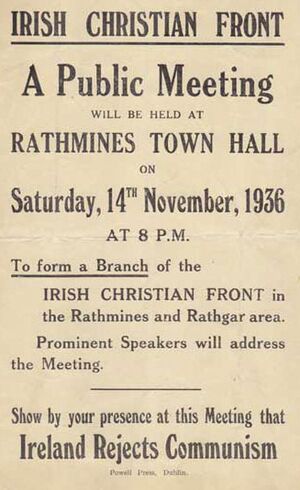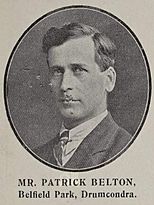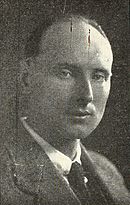Irish Christian Front facts for kids

The Irish Christian Front (ICF) was a group in Ireland that supported the Catholic Church. It started in August 1936 and ended in October 1937. The group was formed to help and raise money for the Nationalist side in the Spanish Civil War.
However, the ICF quickly started to focus on Irish politics too. They disagreed with the Irish government at the time. The ICF managed to send a lot of money and supplies to the Nationalists in Spain. But their ideas for Ireland were never put into action.
The ICF is strongly connected to its founder, Patrick Belton. He was the group's president and main leader. Some people in Ireland accused Belton and the ICF of being fascist. Belton replied that if defending Christianity meant being a fascist, then he was one.
Contents
Starting the Irish Christian Front
The Spanish Civil War began in July 1936. Spanish officers, led by Francisco Franco, rebelled against their country's government. Many people in Catholic Ireland felt sympathy for the rebels. They saw the rebels as protecting Spain from communism, which they believed was against religion.
Irish newspapers, especially the Irish Independent, generally supported the rebel side (called the Nationalists). News about the murders of over 6,000 priests and Catholic people was widely reported. Many Irish people saw the war as a religious fight, not just a political one.
Because of this, the Irish Christian Front was created. It was seen as the most important way that Irish people showed support for Franco. The group started after the Irish Independent newspaper asked for a committee to help organize Irish support for the Nationalists.
The first meeting of the ICF was on August 31, 1936, at the Mansion House in Dublin. Alfie Byrne, who was the Lord Mayor of Dublin, spoke at the meeting. Soon, many local branches of the ICF were formed across the country, often by people acting on their own. The ICF was strongest in the Leinster area.
Patrick Belton, who was a member of the Irish parliament (TD) for Cumann na nGaedheal, was the only president of the ICF. He was its main leader. Alexander McCabe, a former TD, was the secretary. An American activist named Aileen O'Brien was the Organizing Secretary and later represented the group in Spain. Joseph Brennan, who later became a TD for Clann na Poblachta and then the Labour Party, was the vice-president.
The ICF said it was open to everyone, no matter their religion, to gain more support. They also claimed to be non-political. They said they only wanted to help the church in Spain, not get involved in Irish politics. At first, their goals were to show Irish support for the Nationalists and raise money.
They held many large public meetings called ‘monster’ rallies. The first rally had over 15,000 people. Another meeting in Cork in September attracted over 40,000 people. Politicians from all major parties spoke at these meetings. So did important trade unionists, religious leaders, university professors, and journalists. Sometimes, there were fights between the crowds and people who disagreed with the ICF.
The ICF's Political Views
The ICF's claim that it was non-political quickly proved to be untrue. By September, the group was already asking the Fianna Fáil government, led by Éamon de Valera, to officially recognize the Nationalist government in Spain. This went against de Valera's policy of neutrality.
Even though the ICF kept pushing, and several local councils supported their idea (called the ‘Clonmel Resolution’), the government did not change its mind. In February 1937, the government passed a law called the Spanish Civil War (Non-intervention) Bill. This law confirmed that Ireland would remain neutral in the Spanish Civil War. Belton later claimed that the Fianna Fáil party secretly supported the other side in Spain.
The ICF also promoted political ideas that were not directly about Spain. These ideas became more and more important to the group. The ICF asked the government to ban communism in Ireland. They also wanted the government to create social policies based on Catholic teachings.
More specifically, they wanted strict rules about books and films. They believed these rules would protect people's morals, especially young people. The ICF also campaigned for economic policies based on Catholic ideas. They supported a system where different parts of society, like workers and businesses, would work together under government guidance.
Why the ICF Ended
The ICF raised over £30,000 for the Nationalists in Spain. They sent medical supplies, including ambulances. The Nationalists in Spain recognized and thanked the ICF for their help.
However, the ICF failed to use the support for Franco to bring their right-wing social and economic policies to Ireland. One reason for this was how the war in Spain changed. The murders of Spanish clergy did not continue after mid-1936. Also, when Germany and Italy got involved in the war, it became harder to say the conflict was purely religious. Terrible events, like the bombing of Guernica, also made it harder to argue that the Nationalists were the morally better side. As a result, Irish people became less enthusiastic about Franco and, therefore, about the ICF.
The ICF's ideas about opposing democracy were not popular in Ireland. The leaders in Dublin could not convince their local branches, let alone the general public, to fully support these ideas. Divisions grew even more when accusations came out that Belton had personally benefited from the money raised for Franco. Even though Belton strongly denied these claims, important politicians and religious leaders started to distance themselves from him and his group. This further damaged the ICF's reputation. Belton himself lost his seat in the July 1937 election. He had campaigned mainly on an anti-communism message.
Disagreements between the Dublin leaders and the local branches about the group's political direction, along with the accusations of corruption, led many branches to close in 1937. The national organization of the Irish Christian Front was officially dissolved in October of that year.
Standing Committee Members
- Patrick Belton (President)
- Dr James P. Brennan (Vice-President)
- Aileen O'Brien (Organizing Secretary)
- Alexander McCabe (Secretary)
- Liam Breen
Images for kids
 | Selma Burke |
 | Pauline Powell Burns |
 | Frederick J. Brown |
 | Robert Blackburn |






